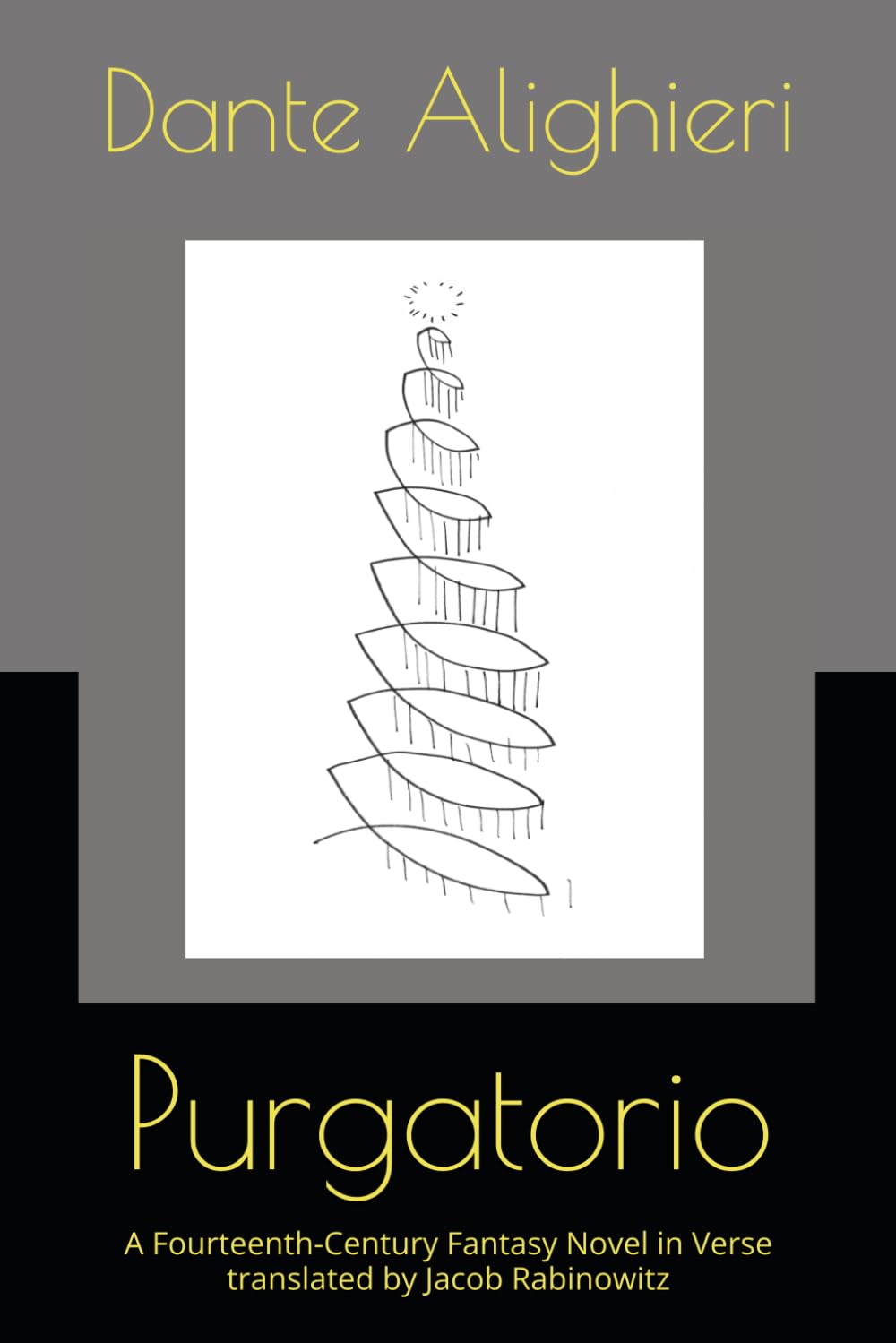
Purgatorio
An accurate translation of the Purgatorio with all notes and clarifications poetically woven into the text so as to permit an immediate reading with full understanding, instead of a scavenger-hunt through the footnotes. This new edition contains copious maps and genealogies to clarify the history, geography, astronomy and cosmology.
from canto XXIII
with my gaze I tunneled in among
those green leaves, like one of those who waste
their lives hunting birds, supposing bow-sport
to be a noble pastime,
he who was more than a father to me
said, “Child of mine, come along, our allotted
time asks a wiser division of the minutes:
we’ve given enough to this.”
I turned my face from the upward foliage
and followed fast after those sages
whose overheard conversation
made all my going seem easy and free.
Suddenly we stopped, hearing
in melodious moans the words of the Miserere,
(the Fiftieth Psalm), “O Lord, open thou
my lips . . .” the voices were pregnant
with pleasure and with pain.
“Sweet teacher,” I began, “what’s this I hear?”
He answered, “Probably souls
untying the knot of their obligations,
paying slowly what they owe.”
Just as pensive pilgrims on their path,
when they meet strangers, if they notice them at all,
only turn to give a moment’s attention,
neither thoughts nor eyes long resting
on whom they meet, they pass unpausing on:
other cares are theirs,
thus a crowd of souls, moving faster than we,
came from behind, marveled at us for a moment,
then passed ahead, silent and devout.
Dark and hollow were the eyes of all,
pale was their skin, their bodies so thin
and diminished that their bones alone
gave taut shape to their stretched and tented hides.
Once upon a time Erysichthon,
impious prince of Thessaly,
cut down a grove sacred to Ceres,
goddess of harvest. He was punished
with such hunger he devoured all he had, consumed
his holdings to pay for more provisions,
but only got skinnier the more he ate,
starving even as he gorged.
Finally he chewed the thin sinews
from his own bones. He ate himself to death.
Not even Erysichthon, diminished to a sliver
of himself, insanely fearing hunger’s pang
more than the taste of death —
not even Erysichthon,
when his fatal desiccation had reduced him absolutely
was so dried a rind
as these shrunk souls.
I thought to myself, “This is how the Hebrews
must have looked in the final days
of the Roman siege of Jerusalem.”
Then, we’re told, a mother, her face
starved sharp as a beak, pecked the flesh
of her own cooked child. The starving partisans
who came upon her grimly feasting,
to whom she offered a portion, fled in terror.
I thought of that inhumanly hungry mother
as I gazed upon these withered spirits,
eyes like rings that have lost their gems,
empty bezels, sunless orbits.
Some say the Latin word for “human,”
homo, stands out on the skull,
printed in ridges, embossified.
The silent “H” isn’t shown,
but the brow and the nose bone form the M
between two eye-socket O’s.
Well, across these faces the name of Man
was labeled large in skull-bone font,
its mortal meaning all too plain.
Who could believe the mere scent of fruit,
the smell of water, could so control a soul
as to shrink and shrivel it
with disembodied longing?
Who could guess the impossible cause?
For now I stayed astounded
to learn that spirits could dwindle,
not fathoming the meager reason
for their shrunken shapes and scaly skin.
Suddenly one of those ghosts
stared intently at me from the deeps
of its eye-pits, then shouted, “What a favor,
meeting you here!”
I’d never have recognized his face,
for that was mostly gone,
but the voice revealed at once in full
all the lost identity.
The single spark of recognition
blown to life by a vocal tone
sufficed to make old memory blaze
and I saw in his ashen mask
and lipless visage the face of my friend Forese.
He said, “Don’t look at the wasted, flaking flesh,
the blotchy scabs, the dull dead hue
of my dried-out hide, the lacking fat,
the death of me —
but tell me true of you,
and of these two escorting souls besides.
Pray, stay, and say what story’s yours!”
I answered, “I already wept once
to look on your dead face;
now I cry for you again, no less,
to see you so distorted.
I can’t yet talk, wonder still stuns me,
gaping takes my words away.
You tell me first, in the name of God,
what abrades your parched armature
flake by flake?”
Forese said, “God’s eternal wisdom
placed in the water and the plant you just passed
the power to make us wane with wanting them.
The whole nation here, tearfully singing,
restore themselves to holy health
through hunger and thirst, for they followed food
and drink, never knowing what was enough.
We’re consumed, as if by fire,
just by thinking only and ever
how much we want to eat and drink,
fascinated by the fragrance of water,
the bouquet of the fruit
wafting down through the branches.
That wasn’t the only such tree along
the circling way, that forever refreshes
our torment as we pass.
There’s always another ahead to renew
our pain — do I say pain?
I should rather call it comfort!
We approach these trees with the same deliberate
good will with which Christ went to his cross.
He felt a subtle unearthly gladness
even as he cried out, “God, my God,
why have you forsaken me?”
He knew a grim and hidden satisfaction
as he bought our freedom with the blood in his veins.”